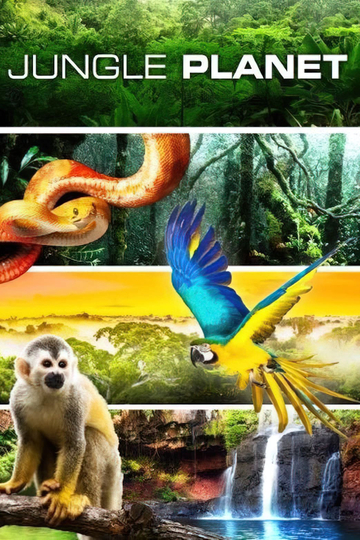Season 1 Episodes
1. Jungle Planet Intro: Life Awakens
Life on Earth is characterized by its enormous richness. Even today, much of its surface is covered with forests and jungles. This series travels to some of the world's major forests and jungles, providing a complete view of their wildlife, biodiversity and importance for life on the planet.
2. The Ancient Jungle: South East Asia & Borneo
The jungles of Borneo and Southeast Asia are among the oldest in the world, at nearly 15 million years old. They are inhabited by a unique and exclusive fauna, orangutans, sun bears, flying lizards, giant rafflesia flowers, macaques and hornbills.
3. The Forests of the Moon: Mangroves
Mangrove forests, which grow along the coasts in the tropics, are magical in appearance. These forests and their inhabitants, such as proboscis monkeys, langurs, mudskippers and bearded wild boars, are dependent on the tides.
4. Butterfly Forest: South African Savannah
The south of Africa is home to an unusual forest that loses its leaves during the dry season. The Mopane tree, or butterfly tree, is the main exponent of this behavior. In this peculiar landscape live elephants, hyenas, lions, colobus monkeys, eagles and mousebirds.
5. Jungles in the Sea: Canary Islands Laurel Forests
The laurel forests of the Canary Islands are relics more than 20 million years old. They grow in the interior of some islands where winds carry clouds and mist. They are jungles full of strange and unique animals, such as Laurel and Bolle's pigeons, lizards, snails and birds of prey.
6. Spectres of the Jungle: Madagascar Rainforest
The Madagascan rainforest is inhabited by lemurs whose howls at dawn and dusk fill the woodland. In this unique ecosystem, more than 14 species of lemur, 30 species of chameleon, strange and striking birds, and countless insects survive.
7. The Forests of Giants: California
In California, redwoods thrive over different mountain ranges, breaking all records of height. Under their canopies, diverse wildlife like black bears, coyotes, mountain sheep, wapiti and squirrels live out their lives, intertwined in a complex web.
8. A World of Thorns: Thorny Forest, Madagascar
Almost all plants are armed with thorns like daggers in the Spiny Forest of Madagascar. The fauna inhabiting this forest includes sifakas, chameleons, three-eyed lizards, radiated tortoises and many endemic birds. All of them have adapted to life among the sharp thorns and permanent drought.
9. A Jungle of Aromas: Australia
The eucalyptus forests of Australia have adapted to the different environments found on the largest island on the planet. Its forests are home to a varied and striking collection of wildlife, including koalas, tree kangaroos and flying squirrels.
10. The Eternal Swamps: Florida
The Florida Peninsula is dominated by an immense wealth of woodlands, specifically wetlands and swamps. Bald cypress and many other tree species grow here, surviving in this amphibious world and providing shelter to deer, alligators, storks and eagles.
11. The Infinite Forest: Taiga
The Taiga is the world's largest forest, occupying the northern regions of North America, Europe and Asia. This seemingly infinite forest of the harshest environmental conditions is inhabited by massive bears, wolverines, wolves and moose.
12. The Rainforest in the Clouds: Central America
The cloud rainforest is a unique ecosystem that grows in equatorial regions, perched on peaks of over 2,000 meters, where clouds permanently deposit water and the weather is cold. The quetzal, hummingbirds, wild cats and monkeys are found here.
13. The Kingdom of the Sun: Madagascan Deciduous Forest
The interior of Madagascar is dry and mountainous, and the forests that grow there lose their leaves during the dry season, except for those that take refuge in narrow canyons eroded by rivers. These forests are home to ring-tailed lemurs, pied crows, various species of tenrec, and unique chameleons that can withstand the harsh environmental conditions.
14. The Conquered Forest: Iberian Oak Forests
The environment of southern Europe and North Africa is the perfect territory for oak trees, huge trees whose branches may be home to more than 300 species of animals, from the critically-endangered imperial eagle, to colonies of stork, genets and mice.
15. Forests of Fire: Canary Pine Forest
One of the most extraordinary forests in the world grows on top of volcanic cones, between rocks and ashes. This is the Canary pine, capable of growing after a fire. Its adaptation has allowed it to colonize some of the harshest ecosystems.
16. Guardians of the River: Danube Floodplain Forests
The rivers of the Northern Hemisphere are naturally flanked by forests adapted to periodic flooding. These are tall, lush forests, the hiding places of otters and ferrets, and whose branches provide shelter and sustenance for colonies of heron and deer.
17. Forests on the Peaks: Atlas and Andalusian Cedars
In Northern Africa and Southern Europe, there are forests that grow only on the highest mountain peaks, unique ecosystems of singular beauty that are home to a variety of wildlife such as Barbary monkeys, osprey, Barbary sheep and the Iberian ibex.
18. Tiny Forests: Mediterranean Olive Woods
The huge expanses of olive groves around the Mediterranean region are a humanized forest where trees grow in an orderly manner. Italy, Spain and Greece benefit from this humanized ecosystem, inhabited by a diverse range of wildlife.
19. The Dark Jungle: Equatorial African Forests
African rainforests are the oldest in the world. They are inhabited by gorillas, chimpanzees and okapi. The biodiversity of these forests includes millions of unknown insects, birds and small mammals.
20. Ephemeral Jungles: Deciduous Forests
In the Northern Hemisphere, forests are adapted to the extreme seasonality of very cold winters and hot, humid summers. This is the deciduous forest, whose leaves change color throughout the year and are lost in winter.
21. A Tropical Eden: American Jungles
The Neotropical forests of South America extend across huge territories with an incredible diversity of trees and plants. Orchids and bromeliads grow on branches, forming a hanging forest.
22. Garden of the Gods: Mediterranean Pine Forest
The coastal regions of the Old Continent are occupied by an evergreen forest that reach to the very edge of the sea. This forest is adapted to the lack of water and high temperatures and is inhabited by a special collection of fauna, such as chameleons.
23. Jungle of the Sun: Dry Tropical American Forest
A look at forests in some regions Central and South America that survive by adapting to droughts and intermittent humidity and serve as habitats to large trees, agoutis, pumas, lizard, and deer.
24. The Mystical Forest: Spanish Juniper Woods
Some of the forests with the most character in the world are the juniper woods. Each juniper tree has its own shape. Juniper woodlands are open and adapted to cold and dry climates. They are of unique beauty, emerging from between bare rocks.
25. The Australian Paradise
A fragile strip of tropical woodland extends along the east coast of the huge island of Australia. It is a unique jungle, caressed by rains and humidity, a place of refuge for a wide range of fauna that lives exclusively here on the edge of the great Australian paradise. Witness the enchanting Australian rainforests where bowerbirds dance and kangaroos ascend trees. Explore the unique synergy between plants and animals, as specific bird species play a vital role in preserving the lush tree life.
26. The Last Forest: Epilogue
A look at how the conservation of forests and jungles is vital to many species, and the only guarantee for future generations to enjoy these precious treasures.



























